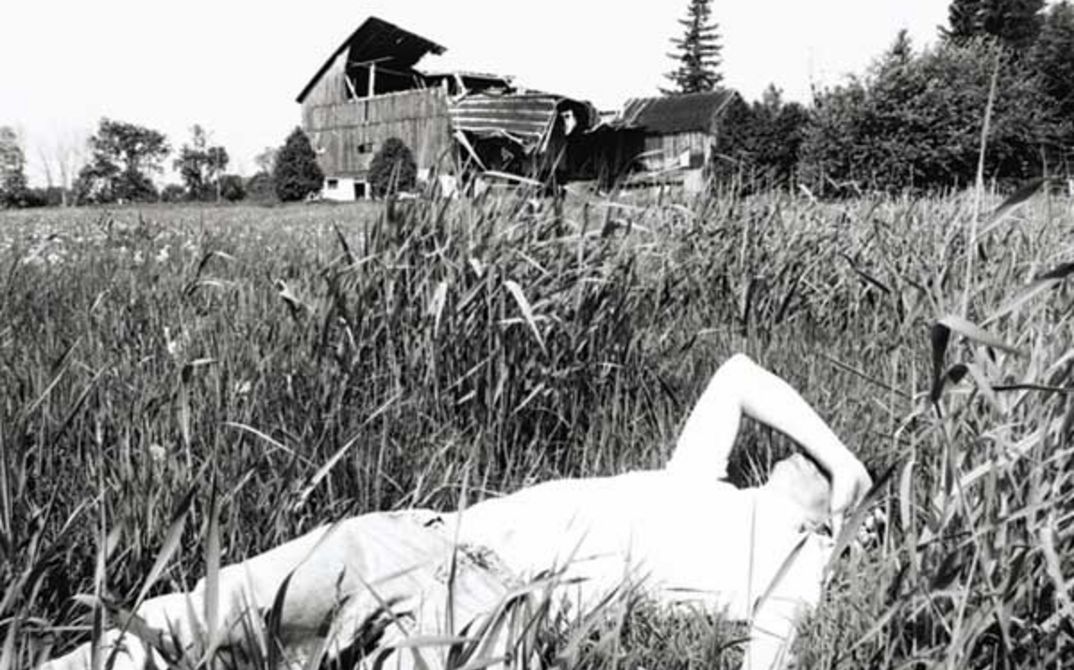Forum expanded Talk and Show:
Episode 7: Handmade Films
12.02. 20:00 Arsenal 2 (admission free)
All Fall Down is an experimental documentary that takes as its starting point a nineteenth-century farmhouse in Southern Ontario, Canada, and asks the question "what has been here before?" The film weaves together a complex temporal structure that juxtaposes the lives of two figures, one historical (Nahneebahweequa: a nineteenth-century aboriginal woman and land rights activist) and the other contemporary (an ex-pat drifter and father of the filmmaker's stepdaughter) across two hundred years. The film explores these characters through a variety of archival materials – diaries, landscape paintings, photographs, heritage films, poems, phone messages, maps, historical re-enactments, songs – that express the complexity of time and the politics of land. The film is structured by Hoffman's extraordinary landscapes of Southern Ontario, which make the temporal fabric shimmer, bringing us a meditation on childhood, property, colonialism, ecology, and love.
"Philip Hoffman has long been recognized as Canada's pre-eminent diary filmmaker. For over twenty years he has been straining history through personal fictions, using the material of his life to deconstruct the Griersonian legacy of documentary practice. As an artist working directly upon the material of film, Hoffman is keenly attuned to the shape of seeing, foregrounding the image and its creation as well as the manufacture of point of view. Hoffman's films are deeply troubled in their remembrances; he dusts off the family archive to examine how estrangement fuels a fascination with the familiar surroundings of home. Mortality forms the absent centre of Philip Hoffman's oeuvre, a body of films that seems to foreshadow a penultimate loss that will take the maker to the outer and inner reaches of grief. Through the repeating figure of death – whether a boy lying on a Mexican roadside in Somewhere Between ..., the death of an elephant at the Rotterdam Zoo, in ?O,Zoo!, or his uncle's legacy of insanity and death in passing through/torn formations – Hoffman approaches the limits of representation and the ethical burdens of vision and reproduction."
(Karyn Sandlos, Images Festival, Toronto, 2001)
"The films of Philip Hoffman have revived the travelogue, long the preserve of tourism officials anxious to convert geography into currency. Hoffman's passages are too deeply felt, too troubled in their remembrance, and too radical in their rethinking of the Canadian documentary tradition to quicken the pulse of an audience given to starlight. He has moved from his first college-produced short, On The Pond – set between the filmmakers familial home and his new found residency at college – to a trek across Canada (The Road Ended at the Beach); from Holland, where he was invited to the set of Peter Greenaway’s A Zed and Two Noughts and made ?O,Zoo! (The Making of a Fiction Film) to Mexico for his haiku-inspired short Somewhere Between Jalostotitlan and Encarnacion; from passing through/torn formations’ pan-continental dialogue of madness and memory to Kitchener-Berlin’s oceanic traversal; and finally, to river, a landscape meditation that leads inevitably home. Denoting the family as source and stage of inspiration, Hoffman's gracious archeology is haunted by death, the absent centre in much of his practice, a meditation on mortality and its representation. His restless navigations are invariably followed by months of tortuous editing as history is strained through its own image, recalling Derrida's dictum that everything begins with reproduction. Hoffman's delicately enacted shapings of his own past is at once poetry, pastiche, and proclamation, a resounding affirmation of all that is well with independent film today."
(Mike Hoolboom, Inside the Pleasure Dome: Fringe Film in Canada, 2001)
Canada 2009, HD 93 minutes
Director, Cinematography, Editing: Philip Hoffman
Production company: Chimera Imaging, Mount Forest, Ontario, Canada
Screenplay: Philip Hoffman, Janine Marchessault
Composer: Tony Edelmann, Tucker Zimmerman
Mixing: Timothy Muirhead
Philip Hoffman's filmmaking began with his boyhood interest in photography. As semi-official historian of family life, Hoffman became intrigued by questions of reality in photography and later in cinema. After completing his formal education, which includes a Diploma in Media Arts and a Bachelor of Arts in Literature, Hoffman began working on his films, as well as teaching film, electronic and computer-based media. He is currently a faculty member in the Film and Video Department at York University.
